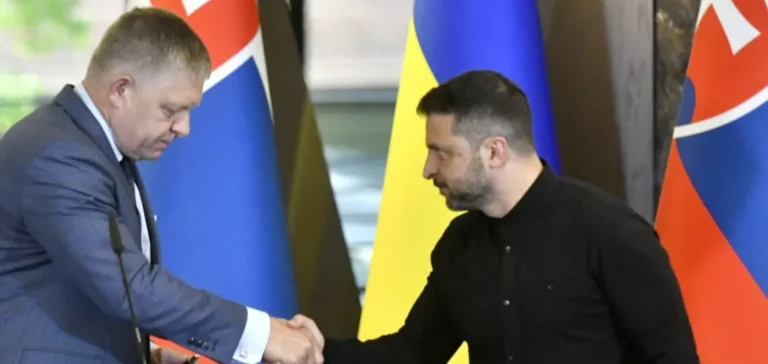Ukrainian President Volodymyr Zelensky called on Slovakia to end its purchases of oil from the Russian Federation during a meeting in Uzhhorod with Slovak Prime Minister Robert Fico. The request specifically targets deliveries through the Druzhba pipeline, a strategic infrastructure still excluded from European sanctions, as Ukraine continues to strike energy facilities used for military purposes by Moscow.
Zelensky stated that Russian oil and gas have no future and expressed his readiness to ensure Slovakia’s energy stability, provided that Bratislava gives up Russian hydrocarbons. Despite differences, he described the talks with Fico as “constructive” and reaffirmed Ukraine’s determination to respond to Russian strikes on its energy infrastructure.
Druzhba remains a point of tension in regional supply
The Druzhba pipeline, temporarily exempt from European sanctions imposed after Russia’s invasion of Ukraine in 2022, continues to supply Slovakia and Hungary. This derogatory status was intended to give these landlocked countries time to find alternative solutions. However, the exception remains a source of tension within the European Union, particularly with countries that have reduced their dependence on Russian crude.
Robert Fico, known for his favourable stance toward dialogue with Moscow, acknowledged major disagreements with Ukraine. He maintained that relations between the European Union and Russia would eventually normalise, insisting on the need to safeguard his country’s economic and energy interests.
Transatlantic pressure and regional criticism
A senior White House official stated that U.S. President Donald Trump had urged European countries to stop buying Russian oil. Zelensky echoed this call during a video intervention at an economic forum in Italy, also targeting Hungary, another beneficiary of the Druzhba pipeline.
Hungarian Minister of Foreign Affairs Peter Szijjarto rejected the accusations, blaming the European Union for failing to support infrastructure upgrades in southeastern Europe. He also accused Croatia of increasing transit fees and failing to expand the capacity of the alternative supply route.
Russia strengthens energy partnerships in Asia
Faced with European restrictions, Russia has redirected a significant portion of its hydrocarbon exports to Asia, notably to China, India and Turkey. However, several European Union countries continue to import Russian liquefied natural gas (LNG), outside the scope of current sanctions. The ongoing operation of the Druzhba pipeline highlights persistent vulnerabilities in the European energy network amid a prolonged conflict.






















